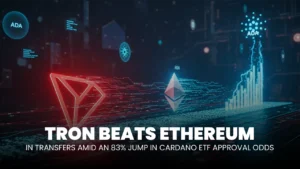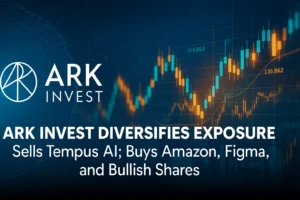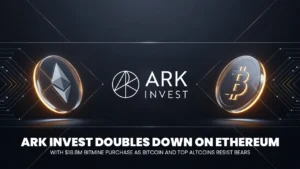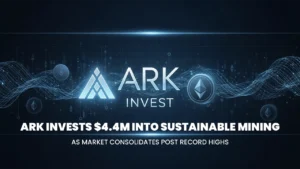Reliance Global Adds ADA on TRON’s $81.2B Rails as Uptober Flywheel SunPerp Pumps SUN Token Buybacks
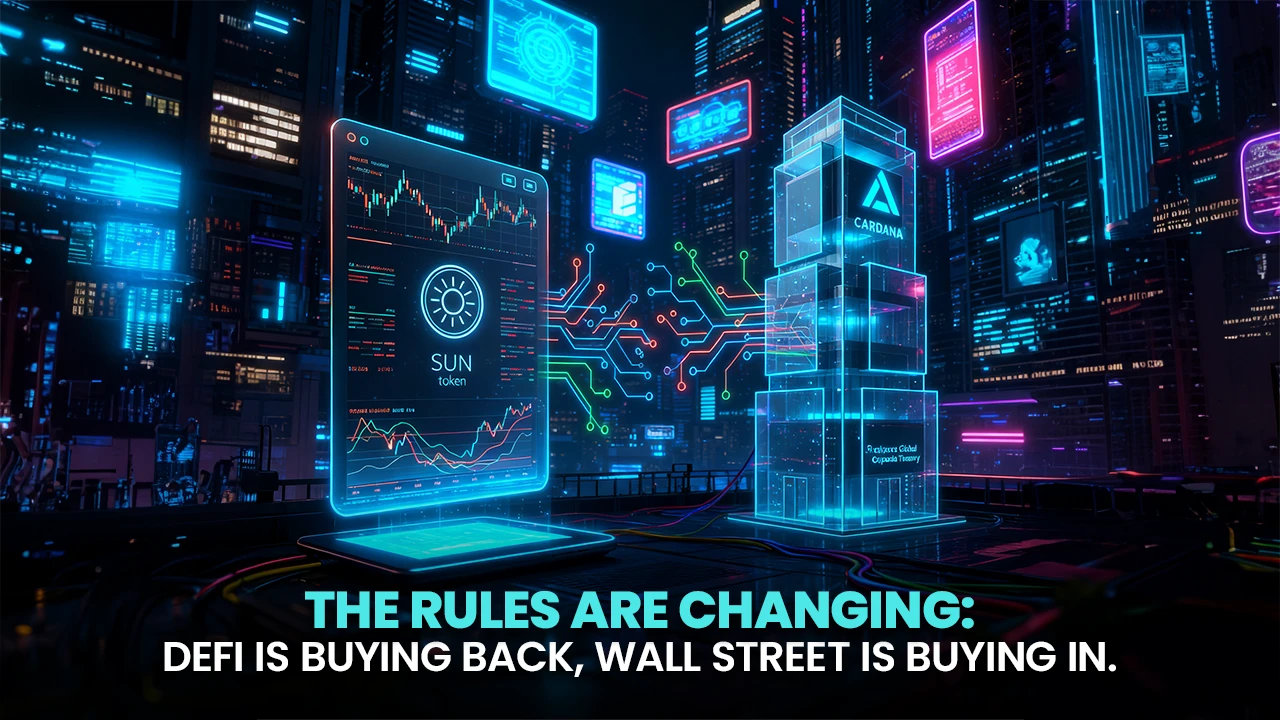
In a week traders call Uptober, crypto delivered a one-two punch that feels bigger than a headline cycle. Justin Sun aligned SunPerp economics behind a simple rule. Every dollar of the perpetual exchange’s revenue will fund buybacks of the SUN token.
- Why These Moves Matter Now
- What Sources Say
- Two Decisions, One Framework
- Market Structure Signals
- What People On X Are Saying
- The DPoS Thread You Cannot Miss
- Uptober Energy Meets Institutional Process
- What To Watch Next
- Analyst Take
- Conclusion
- Frequently Asked Questions About SunPerp And Cardano Treasury
- Is SunPerp actually spending 100 percent of its revenue on SUN buybacks?
- Did a public company really buy Cardano for its treasury?
- How does Delegated Proof of Stake support SunPerp’s model?
- Does Cardano use Delegated Proof of Stake?
- Why do these two stories belong together?
- Are these announcements price predictions?
- What should investors monitor from here?
- How does this relate to institutional adoption?
- Are there governance risks?
- What is the near-term significance for traders?
- Glossary of Key Terms
On a different flank of the market, Reliance Global Group, a Nasdaq-listed insurance and services company, completed its first purchase of Cardano as part of a Digital Asset Treasury plan. One is protocol finance in motion. The other is corporate treasury policy, stepping on chains.
Together, they read like a single story about rules-based capital flows, the rise of Delegated proof of stake assets, and the steady normalization of crypto inside real businesses.
ALSO READ: SunPerp Debuts on TRON, Challenges dYdX, GMX, and Hyperliquid with Cheaper Trades
Why These Moves Matter Now
SunPerp’s 100 percent revenue to buybacks pledge is not a marketing flourish. It hard-codes recurring demand for SUN into the business model of a trading venue that competes on liquidity and product velocity. The Reliance Global purchase of ADA is not a side bet.
It formalizes crypto exposure inside a governed treasury program, with prior disclosure that Ethereum was the first asset and Cardano is the next. Both decisions create rule books that investors can track, test, and model. In a market that rewards clarity, that is oxygen.
Delegated Proof of Stake DPoS sits close to the SunPerp decision. TRON’s broader ecosystem runs on Delegated Proof of Stake, which emphasizes elected validator sets and fast finality. When a protocol that serves that ecosystem routes all revenue into SUN buybacks, it links activity, fees, and token demand in a tight loop.
Supporters of DPoS argue that this kind of closed circuit between usage and token value is exactly what can pull in deeper liquidity during volatile periods. The logic is simple. More trading means more protocol revenue. More revenue means bigger buybacks. Bigger buybacks create a predictable bid that market makers can plan around.
The Reliance Global step rhymes with a different tradition. Corporate treasuries diversify prudently, disclose decisions to investors, and submit to board oversight. The company’s statement places Cardano’s design and adoption profile inside a treasury framework rather than a trading thesis.
That sets a precedent for other mid-cap and small-cap public companies that want controlled crypto exposure with clear governance. It also marks a practical win for proof-of-stake assets as credible holdings on a balance sheet.
ALSO READ: PayPal’s PYUSD Lands on TRON Through LayerZero, Lifts Cross-Chain Reach to 1.3B
What Sources Say
Coverage of SunPerp’s buyback policy is direct. Justin Sun pledged that one hundred percent of SunPerp revenue will be used to repurchase SUN, a move observers framed as Uptober’s biggest play because it builds constant buy-side pressure and a cleaner link between product success and token demand.
The same week, Reliance Global disclosed the completion of its first Cardano purchase as part of a Digital Asset Treasury initiative, following an earlier Ethereum purchase and overseen by a governance structure. Neither announcement asks investors to imagine future roadmap items. Both document actions taken.
Two Decisions, One Framework
Read the two moves through one lens. The market is rewarding rules. For SunPerp, the rule is revenue in, buybacks out. For Reliance Global, the rule is balance sheet diversification via liquid proof of stake assets under a board-guided policy.
In both cases, the rules create transparency. They also create repeatability. That is what large allocators and serious traders need before they commit scale capital.
To make the through line clear, here is the side-by-side view.
| Dimension | SunPerp decision | Reliance Global decision |
| Actor | SunPerp protocol in the TRON ecosystem | Reliance Global Group, a Nasdaq-listed company |
| Action taken | Commit 100 percent of protocol revenue to buy back SUN | Complete the initial Cardano purchase under a Digital Asset Treasury program |
| Objective | Build a continuous bid that links usage to token demand | Diversify treasury with a liquid proof of stake asset alongside Ethereum |
| Governance lens | A protocol-level economic policy that traders can monitor | Corporate treasury policy with board oversight and investor disclosure |
| Validation source | Report outlining the buyback pledge and its Uptober framing | Press release and coverage summarizing the ADA treasury addition |
| Connection to DPoS | DPoS network context aligns usage, fees, and incentives | Treasury nod to proof of stake assets as balance sheet components |
Market Structure Signals
SunPerp’s move reads like a protocol-level capital return policy. In traditional finance, companies return capital through dividends and buybacks. Here, the exchange ties its revenue engine directly to open market purchases of its token. That mechanical link is legible to quants and discretionary funds alike.
It also encourages on-platform activity because users can believe their fees fund a predictable bid in the background. In a DPoS environment where throughput is high and validators are elected, the network-level speed can amplify the effect. Traders settle fast. Fees accrue. Buybacks fire. The story stays tight.
Reliance Global’s decision sends a different but complementary message. Public companies can add proof of stake assets to treasury programs when governance, custody, and disclosure are in place. The press release underscores Cardano’s research-driven approach and scalable design as factors in the selection. That framing matters for banks, insurers, and service companies that want to engage with crypto without building trading desks. A measured ADA allocation is a clean way to learn while maintaining policy discipline.
ALSO READ: eToro Onboards XDC as Circle Anchors USDC Settlement for Global Trade Finance
What People On X Are Saying
A sample of the real-time conversation adds color to the narrative.
- GM Justin Sun has announced that all the revenue generated by the SunPerp exchange will be used to buy back the SUN token. Link:
GM
💸Justin Sun has announced that all the revenue generated by the SunPerp exchange will be used to buy back the SUN token. pic.twitter.com/bzPqwfoj2R
— Captain GM (@g13m) September 20, 2025
- Reliance Global Group completes an initial Cardano purchase under its Digital Asset Treasury initiative. Market watchers are flagging it for follow up.
Reliance Global Group (RELI) Completes Initial Cardano (ADA) Purchase Under Digital Asset Treasury Initiative.
Keep eyes on this, might catch on once $BOXL and $AGRI lets go of volume.
Room to $1.20 and more if so.
— PlayBookTrades 🎯 (@PlayBookTrades) September 22, 2025
These posts do not replace filings or releases. They do show how quickly the themes spread across trader networks and small cap watchers.
The DPoS Thread You Cannot Miss
Delegated Proof of Stake is central to how the TRON ecosystem scales. By design, DPoS lets token holders elect validators, concentrate block production, and keep throughput high. That environment is friendly to perpetual exchanges that live on speed and liquidity.
When SunPerp pipes every dollar of revenue into SUN buybacks, the DPoS story gets a practical kicker. Activity is not just activity. It becomes a funding stream for a predictable market operation. The link between Delegated Proof of Stake dynamics and protocol finance tightens. It is not the only model in crypto, but the fit between DPoS economics and a buyback flywheel is hard to ignore.
Cardano does not use Delegated Proof of Stake. It uses a different proof-of-stake design. Yet Reliance Global’s embrace of ADA still supports a positive read through for the broader proof of stake economy.
A public company added a proof of stake asset to its treasury and explained why in language corporate boards understand. That normalizes chain assets for CFOs and audit committees who need to see process, not hype.
Uptober Energy Meets Institutional Process
Uptober tends to elevate momentum stories. The SunPerp pledge contains momentum, but it also contains math. A revenue capture mechanism that buys on the open market is measurable. If volumes rise, the buyback bid should rise with it.
If volumes fall, the bid fades. That is a rule a risk desk can underwrite. It is also a signal that SunPerp and its related projects want to compete for liquidity with tools that institutions recognize.
Reliance Global’s step qualifies as process first. It is not a one-off trade. It is part of a program that started with Ethereum and now includes Cardano. The company’s language signals oversight by a Crypto Advisory Board and a willingness to keep adding where it sees fit. That cadence suits pension funds and insurers watching from the sidelines. The template is visible. Pick liquid networks. Put governance first. Disclose. Repeat.
ALSO READ: Sui Links Up with Bitkub as Thailand Pushes Web3 Education and Scale
What To Watch Next
For SunPerp and SUN, watch realized volumes, the cadence of buybacks, and any disclosed mechanics on burning or treasury management. For Reliance Global and ADA, watch follow-on disclosures, custody partners, and any notes about insurance-linked products that might leverage blockchain rails.
The two paths may converge if corporate users start interacting directly with DPoS networks to settle niche workflows while holding proof of stake assets on their books. The idea is not far-fetched when rules are clear and execution is fast.
Analyst Take
The common thread is discipline. Delegated Proof of Stake networks like TRON are leaning into native economics that connect activity to token value with minimal friction.
Corporate treasuries like Reliance Global’s are leaning into a measured approach that treats crypto as part of a diversified asset mix. Enthusiasm is earned when plans become policy and policy becomes execution. Uptober gave us exactly that.
Conclusion
Crypto’s maturing moment is not about a single token or ticker. It is about rules that persist through cycles. SunPerp’s all revenue to SUN buybacks rule fits the speed and incentive structure of a DPoS ecosystem.
Reliance Global’s ADA purchase fits a regulated treasury program that can grow step by step. Both actions invite scrutiny because they are testable. Both invite participation because they are repeatable. That combination is how excitement survives the next turn of the market.
Frequently Asked Questions About SunPerp And Cardano Treasury
Is SunPerp actually spending 100 percent of its revenue on SUN buybacks?
Yes. Reporting states that Justin Sun pledged all SunPerp revenue for SUN buybacks, which creates recurring buy-side pressure that investors can track.
Did a public company really buy Cardano for its treasury?
Yes. Reliance Global Group announced it completed an initial Cardano purchase under its Digital Asset Treasury initiative, following an earlier Ethereum purchase.
How does Delegated Proof of Stake support SunPerp’s model?
DPoS emphasizes elected validators and fast settlement. That speed helps perpetual exchanges. When revenue from that activity funds buybacks, the DPoS incentive loop tightens between usage and token demand.
Does Cardano use Delegated Proof of Stake?
No. Cardano uses its own proof-of-stake protocol. Reliance Global’s choice still signals corporate acceptance of proof of stake assets on the balance sheet.
Why do these two stories belong together?
They both put rules around capital. SunPerp sets a protocol rule that revenue funds SUN buybacks. Reliance Global sets a treasury rule that crypto belongs in a diversified balance sheet.
Are these announcements price predictions?
No. They are disclosures and policies. The interest is in the mechanics and governance, not in forecasting prices.
What should investors monitor from here?
For SunPerp, track exchange volume and buyback execution. For Reliance Global, track treasury updates, custody arrangements, and any new assets added.
How does this relate to institutional adoption?
Clear rules and disclosures reduce friction for institutions. DPoS networks with predictable economics and corporate treasuries with board oversight are easier to underwrite.
Are there governance risks?
Every model carries risk. Protocol buybacks depend on ongoing revenue. Corporate treasuries depend on policy and compliance. Transparency allows those risks to be evaluated.
What is the near-term significance for traders?
Traders can model the SUN bid as a function of SunPerp volume and can treat the Reliance Global news as a data point for proof of stake adoption in public company treasuries.
Glossary of Key Terms
- Delegated Proof of Stake DPoS. A consensus approach where token holders elect validators and concentrate block production to raise throughput.
- Buyback. Open market repurchases of a token or stock using revenue or treasury funds to reduce free float.
- Treasury policy. The rules set governing how a company holds cash and other assets for operations and risk management.
- Perpetual exchange. A derivatives venue where contracts track spot via funding payments and have no expiry.
- Liquidity. The ability to enter and exit positions with minimal price impact at size.
- Throughput. The number of transactions a network can process per second under normal conditions.
- Finality. The point at which a transaction is considered irreversible on a blockchain.
- Proof of stake. A consensus mechanism where validators stake tokens to secure the network and earn rewards.
- Governance. The set of rules and processes that direct decision-making in a protocol or corporation.
- Disclosure. Public communication of material information by a company or project.

